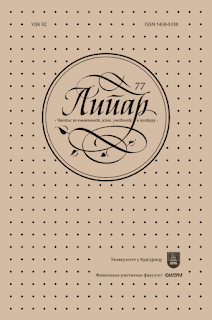SUBVERZIVNA ULOGA MUZIKE U PROCESU REKONSTRUKCIJE IDENTITETA U ROMANU "LJUBAV" TONI MORISON
THE SUBVERSIVE ROLE OF MUSIC IN IDENTITY RECONSTRUCTION IN THE NOVEL "LOVE" BY TONI MORRISON
Author(s): Ivana S. Jovanović NikolićSubject(s): Social Sciences, Language and Literature Studies, Studies of Literature, Sociology, Sociology of Culture, American Literature
Published by: Универзитет у Крагујевцу
Keywords: identity;music’s subversiveness;identity fluidity;jazz;blues;post-modernism
Summary/Abstract: Growing up surrounded by music, Toni Morrison “inherits” a family- shared relationship towards this form of art, as a “tool” for preservation of one’s own history as well as of the communal history. Morrison understands the role of music as a valuable tool for the revision and reconstruction of identity in a system ruled by racial differentiation. The author has, on numerous occasions, pointed out that music “informs” her i.e. that her attempts to reconstruct its structure in her writing have led to a rise of literature where there are “more rather than less opportunities” (Stepto, 1977: 488). This literature is: sophisticated, demanding and yet so available. That type of literature, the type that upsets its reader, possesses a one-of-a-kind rhythm; a rhythm whose culmination is a sort of a bang, a unique beat which exists on a level underneath a linguistic one; that beat, so energetic and yet so balanced, must be heard rather than read. This type of literature offers the readers a sort of power – an opportunity to develop and progress i.e. overcome the existing limitations of its being. The novel Love, is, among other things, the author’s attempt to comprehend the why and how of love betrayal. She also deals with the issue of female identity and position of women at times when the African-American community was “doing its best” to “imitate” the patriarchal model of family life of white men. By bringing in the rhythm, repetition and musical patters as those appearing in jazz and blues, the author is transforming the language of its novel so that the characters are empowered to independently talk about their experi- ence. By changing the “stale” narrative forms, the author is “securing” the unity of African-American community and the right to their own identity. Furthermore, she is “reinforcing the idea of love as a space where one could negotiate freedom” (Schappell, 1992:83).
Journal: Липар - часопис за књижевност, језик, уметност и културу
- Issue Year: XXIII/2022
- Issue No: 77
- Page Range: 123-148
- Page Count: 26
- Language: Serbian

